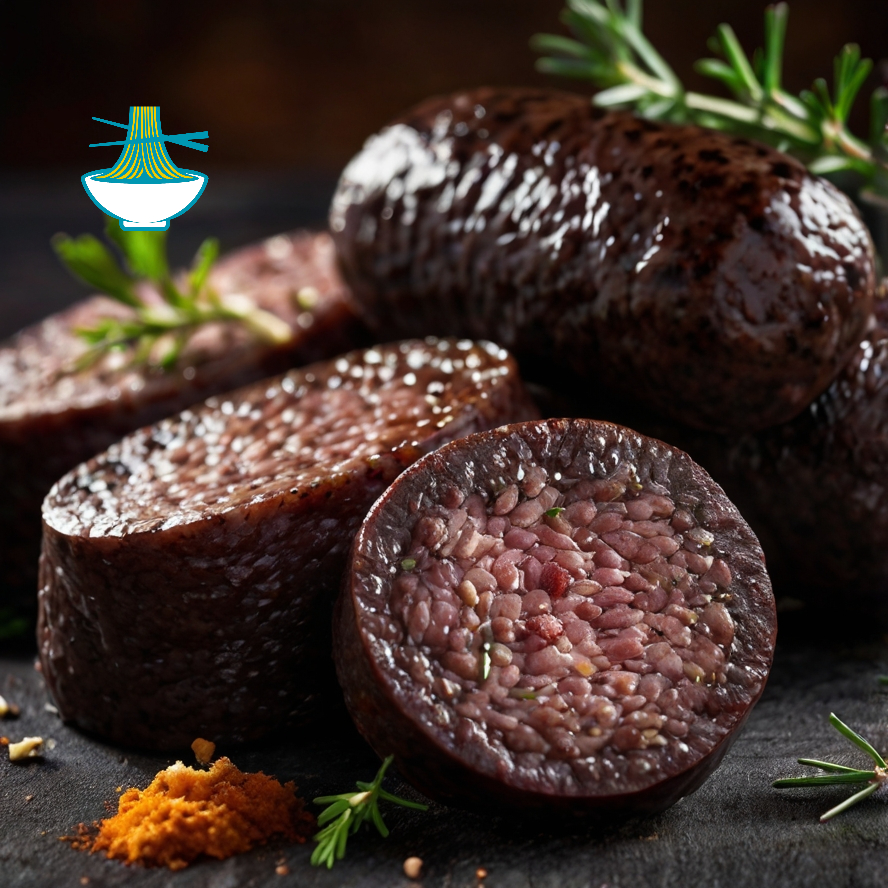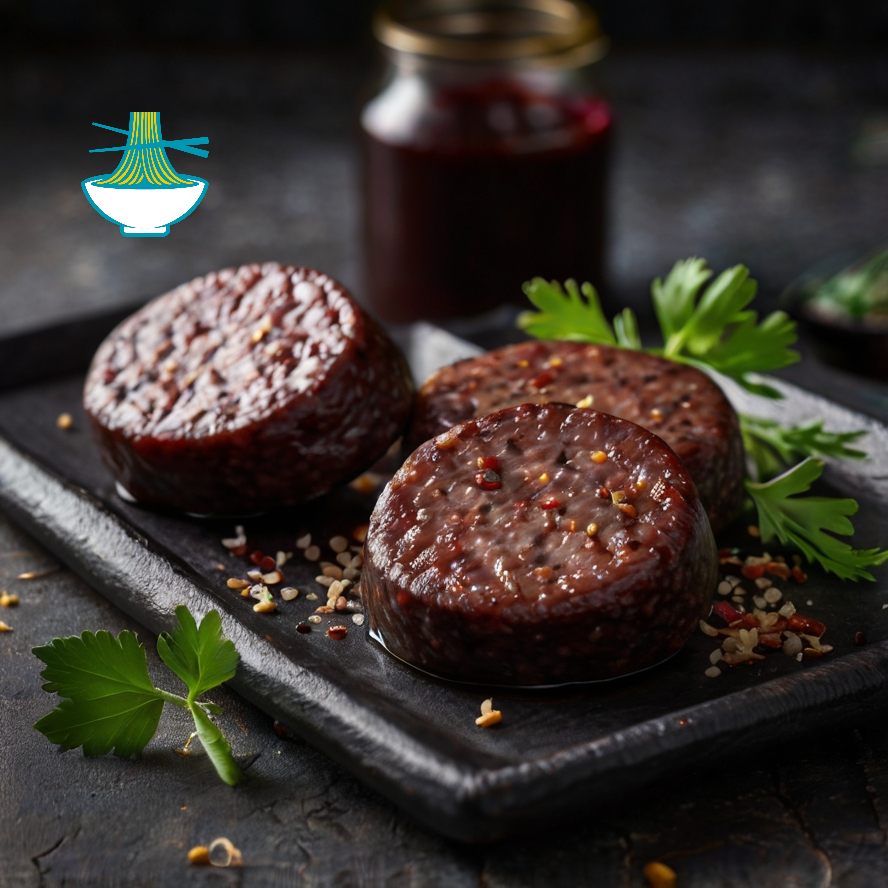Discover how to make authentic Black Pudding, a traditional blood sausage that's rich in flavor and history. Our detailed recipe guides you through combining pork blood, fat, and a blend of seasonings to create this classic dish. Perfect for breakfast or as a unique addition to your culinary repertoire.
Ingredients:
- 2 cups pork blood
- 1 cup pork fat, finely chopped
- 1 cup steel-cut oats or barley
- 1 large onion, finely chopped
- 2 cloves garlic, minced
- 1 teaspoon salt
- 1 teaspoon black pepper
- 1 teaspoon ground allspice
- 1 teaspoon dried thyme
- 1/2 teaspoon ground cloves
- 1/2 teaspoon paprika
- 1/2 teaspoon cayenne pepper (optional, for heat)
- Sausage casings (natural or synthetic), soaked and rinsed
Instructions:
Prepare the Casings:
- Rinse the sausage casings under cold water. Soak them in water with a little salt for at least 30 minutes, then rinse again. Set aside.
Cook the Oats:
- In a medium saucepan, cook the oats or barley in boiling water for about 15 minutes, or until tender. Drain and set aside.
Prepare the Mixture:
- In a large bowl, combine the pork blood, chopped pork fat, cooked oats, chopped onion, and minced garlic. Mix well.
Season the Mixture:
- Add salt, black pepper, allspice, thyme, cloves, paprika, and cayenne pepper to the mixture. Stir until everything is evenly combined.
Stuff the Casings:
- Carefully stuff the sausage casings with the blood mixture, being cautious not to overfill. Tie off the ends with butcher’s twine. Twist into 6-8 inch links and tie the ends securely.
Cook the Black Pudding:
- Bring a large pot of water to a boil. Reduce heat to a simmer and carefully add the sausages. Simmer for about 45 minutes to 1 hour, or until firm and cooked through. Avoid boiling, as this can cause the casings to burst.
Cool and Store:
- Remove the sausages from the pot and let them cool on a rack. Once cooled, store in the refrigerator for up to a week or freeze for longer storage.
Serve:
- Black pudding can be sliced and pan-fried until crispy or used in various dishes. Enjoy as part of a traditional breakfast or as a savory addition to your meals.
Nutritional Values
Pork Blood - 2 cups
- Calories: 330 kcal
- Protein: 68g
- Fat: 2g
- Carbohydrates: 0g
Benefits: Pork blood is rich in high-quality protein and iron, which is vital for oxygen transport in the blood. It also contains vitamin B12, which supports nerve function and red blood cell production.
Pork Fat, Finely Chopped - 1 cup
- Calories: 850 kcal
- Protein: 2g
- Fat: 94g
- Carbohydrates: 0g
Benefits: Provides a concentrated source of energy and flavor. Pork fat contains saturated and monounsaturated fats, which are essential for energy storage, insulation, and the absorption of fat-soluble vitamins.
Steel-Cut Oats or Barley - 1 cup
- Calories: 300 kcal (oats); 193 kcal (barley)
- Protein: 10g (oats); 3.5g (barley)
- Fat: 5g (oats); 0.6g (barley)
- Carbohydrates: 55g (oats); 44g (barley)
Benefits: Both oats and barley are excellent sources of fiber, which aids in digestion and helps regulate blood sugar levels. They also provide protein, iron, magnesium, and B vitamins that support energy metabolism.
Onion, Finely Chopped - 1 large
- Calories: 60 kcal
- Protein: 1.7g
- Fat: 0.2g
- Carbohydrates: 14g
Benefits: Onions are rich in antioxidants, vitamin C, and fiber, supporting immune health, reducing inflammation, and promoting cardiovascular health.
Garlic, Minced - 2 cloves
- Calories: 9 kcal
- Protein: 0.4g
- Fat: 0g
- Carbohydrates: 2g
Benefits: Contains allicin, a compound with anti-inflammatory, antibacterial, and antioxidant properties. Garlic may help boost the immune system and lower blood pressure.
Salt - 1 teaspoon
- Calories: 0 kcal
Benefits: Essential for maintaining electrolyte balance, nerve transmission, and muscle function. Excessive intake should be avoided to prevent high blood pressure.
Black Pepper - 1 teaspoon
- Calories: 6 kcal
- Protein: 0.2g
- Fat: 0.1g
- Carbohydrates: 1.4g
Benefits: Contains piperine, which may improve digestion and nutrient absorption, and has antioxidant properties.
Ground Allspice - 1 teaspoon
- Calories: 6 kcal
- Protein: 0.1g
- Fat: 0.1g
- Carbohydrates: 1.4g
Benefits: Rich in antioxidants and has anti-inflammatory properties. It can also aid in digestion and provide a warm, sweet-spicy flavor.
Dried Thyme - 1 teaspoon
- Calories: 3 kcal
- Protein: 0.1g
- Fat: 0.1g
- Carbohydrates: 0.7g
Benefits: Thyme contains antioxidants and has antimicrobial properties. It may help improve digestion and support respiratory health.
Ground Cloves - 1/2 teaspoon
- Calories: 3 kcal
- Protein: 0.1g
- Fat: 0.1g
- Carbohydrates: 0.7g
Benefits: High in antioxidants and has antibacterial and anti-inflammatory properties. Cloves may aid in digestion and dental health.
Paprika - 1/2 teaspoon
- Calories: 3 kcal
- Protein: 0.15g
- Fat: 0.15g
- Carbohydrates: 0.6g
Benefits: Rich in antioxidants and vitamins A, E, and B6. May help reduce inflammation, improve eye health, and support the immune system.
Cayenne Pepper (Optional) - 1/2 teaspoon
- Calories: 3 kcal
- Protein: 0.15g
- Fat: 0.2g
- Carbohydrates: 0.6g
Benefits: Contains capsaicin, which may help boost metabolism, improve digestion, and provide anti-inflammatory effects.
Sausage Casings (Natural or Synthetic), Soaked and Rinsed
- Calories: Varies depending on the type and size used
Benefits: Natural casings are typically made from animal intestines and provide a source of collagen, which may benefit skin and joint health. Synthetic casings (e.g., cellulose or collagen) are more uniform and used for commercial sausage production.
These values are approximate and can vary based on specific brands, preparation methods, and ingredient variations.


Comments